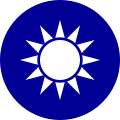 | |
| 梅花旗 (Méihuāqí), literally "Plum Blossom Banner" | |
| Proportion | 2:3 |
|---|---|
| Adopted | 1981 |
| Design | The national emblem above the Olympic Five Rings, surrounded by five-petal plum blossoms (the national flower) in red, white, and blue. |

| This article is part of a series on |
 |
|---|
The Chinese Taipei Olympic flag which is the Flag of the Chinese Taipei Olympic Committee, is used by the Republic of China (ROC) Taiwan team, which competes under the title "Chinese Taipei" during the Olympic Games and other events, in place of the flag of the Republic of China. This is a result of the complex cross-strait relations between the Republic of China and the People's Republic of China. The Olympic flag has been in use since 1981, following the decision by the International Olympic Committee that the ROC could not compete under the country's name or flag.
Due to this restriction, the National Anthem of the Republic of China also could not be played when the team wins medals, so, instead, the National Flag Anthem of the Republic of China was played during the flag raising of the medal ceremony.
The flag shows the Blue Sky with a White Sun (the emblem of the Republic of China and the Kuomintang) and the Olympic rings, encircled by a five-petaled Prunus mume (the ROC's national flower) drawn in red, white, and blue (the colors of the ROC flag). [1]
In addition to its use in the Olympics, some companies operating in mainland China use the Chinese Taipei flag in place of the ROC flag to represent Taiwan since the PRC does not recognize the ROC.












